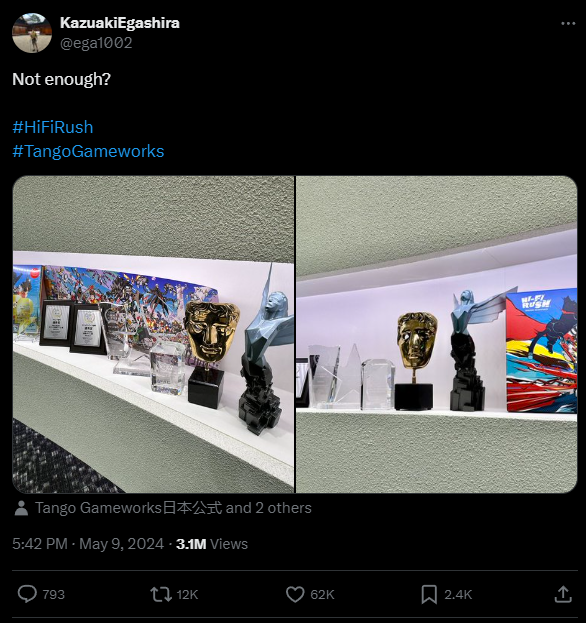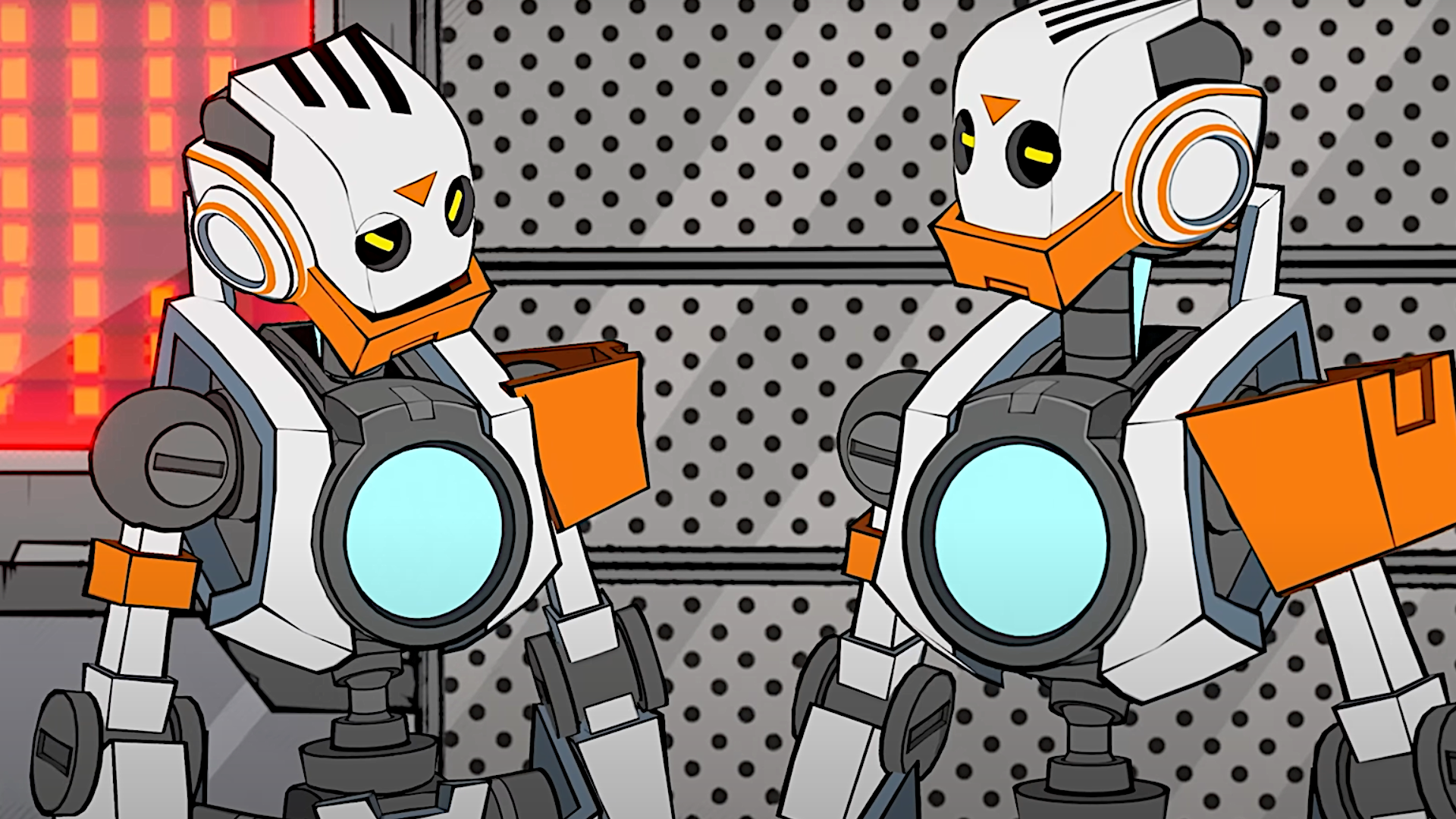President of Xbox asked about the closure of Hi-Fi Rush developer Tango Gameworks, spends close to a minute saying almost nothing
Something something, long-term commitment.
The recent closures of Arkane Austin (Dishonoured, Prey) and Tango Gameworks (Hi-Fi Rush) have sent ripples throughout the gaming industry. Arkane has a beloved library of games, but recently flubbed on Redfall—while Tango seems unceremoniously shuttered after the comparative success of its most recent title.
Microsoft's messaging on exactly why Tango Gameworks was shut down is…. Well, it's mixed to say the least. In the initial internal email, Xbox's Matt Booty signalled a desire to focus on "blockbuster" hits and Bethesda games. Then, in a later town hall, Booty argued that Xbox as a brand needed to develop smaller games that would win the company more awards. As many have pointed out over the past week, that's pretty much what Hi-Fi Rush was.
Said statement even prompted Tango's Game Project Manager Kazuaki Egashira to tweet out a devastatingly simple "Not enough?" with a picture of the various awards Hi-Fi Rush had gathered.

There's a bit of nuance to be found there, in fairness. Hi-Fi Rush certainly wasn't 'small indie' in terms of its cost, as per the developers themselves—and it had a larger team towards the tail-end of its development. But it did absolutely start small, and it did absolutely win awards.
Recently, Bloomberg sat down with Sarah Bond, President of Xbox, for an interview at Bloomberg Tech in San Francisco. Overall, the picture that Bond paints is one of struggle—companies of the modern era have to justify their existence not just with success, but growth, and Microsoft's been struggling to do that.
"The last year or so in videogames," says Bond, "largely the industry's been flat … [we saw some] tremendously groundbreaking games, but the growth didn't follow all that."
She's not wrong, here, when she notes that both the cost of AAA blockbuster games and their development time is "going up"—still, Bond argues, Xbox feels a "deep responsibility to ensure that the games we make … are there through moments even when the industry isn't growing, and when you're going through a time of transition."
Keep up to date with the most important stories and the best deals, as picked by the PC Gamer team.
"The news we announced," that is, the closures of studios that make games, are "an outcome of that". A "commitment to make sure the business is healthy for the long-term."
That's some mirror-world logic on the face of it, but hey—I get the gist, at least. The line has to keep going up, and sometimes parts of a company have to go to make that happen. I don't agree with the situation, it's a miserable state of affairs, but we lie in the bed that's been made for us. That's something Phil Spencer even outright stated last year, arguing that the current circumstances of max layoffs could be solved if the industry got "back to growth".
Then Bond is asked about Tango Gameworks, and fires back an answer that seems both off-the-cuff and completely deflective. Bond speaks for almost a full minute and says pretty much nothing substantive—I'll be quoting it for posterity's sake and sharing the clip, nonetheless.
Xbox president Sarah Bond responds to a question from Bloomberg's @dinabass about why Hi-Fi Rush developer Tango Gameworks was shut down. Full interview here: https://t.co/te5Trhut0Q pic.twitter.com/LGs0n9iV0tMay 10, 2024
"One of the things I really love about the games industry is it's a creative artform, and it means that the situation—and what success [means] for each game and studio is also really unique," Bond begins. "There's no 'one-size fits all' to it for us. And so we look at each studio, each game team, and we look at a whole variety of factors when we're faced with making decisions and trade-offs like that."
I'd like to take a moment to point out that Hi-Fi Rush itself was considered a success "in all key measurements and expectations" as per Microsoft's Aaron Greenberg. If we apply Bond's reasoning, success not only changes based on a studio, but with the onward march of time—the successes of yesteryear might suddenly stop being successes, I guess, especially when trade-offs are on the table.
Bond adds: "But it all comes back to our long-term commitment to the games we create, the devices we build, the services—and ensuring that we're setting ourselves up to be able to deliver on those promises." That's it, next question. No elaboration.
I'd like to analyse this answer some more, but as you've probably surmised it really doesn't say anything. Success looks different for different games, and also Xbox has a nebulous, undefined "long-term commitment" to its games. For some arcane, unknowable reason not accessible to the minds of mortal beings, Tango Gameworks had to go to make that dream a reality. It was for its own good.

Responses to the answer from both developers, fellow journalists, and fans of the studio's past work have been similarly baffled:
"What's shocking here isn't the lack of a good answer but the fact that Xbox didn't even seem to even bother prepping for the question," writes Kotaku's Ethan Gach.
Ethan Taylor, cinematic director at Summerfall Studios (Stray Gods), adds: "Not a single person at the top is equipped to explain their decision making, it’s baffling, do they know why they’re doing it?"
There's a further deluge of quote-tweets I'm not going to share here, because that'd leave us all locked in the same place in a while, but the consensus absolutely seems to be that this is both a bowl of word salad and a complete PR disaster.
But listen—I'm not that interested in dwelling on the interview. Bond is a corporate figure, so a corporate answer is completely unsurprising. As has already been asked, however, why wasn't she more prepared? Or, perhaps more concerningly, why is the company's explanation for Arkane Austin and Tango's closure so scattershot and non-committal?
I wish I had the answers, but if I'm being honest, I don't really think Microsoft's Xbox division has any themselves, other than a confirmation that making good, profitable games will "no longer keep you safe".

Harvey's history with games started when he first begged his parents for a World of Warcraft subscription aged 12, though he's since been cursed with Final Fantasy 14-brain and a huge crush on G'raha Tia. He made his start as a freelancer, writing for websites like Techradar, The Escapist, Dicebreaker, The Gamer, Into the Spine—and of course, PC Gamer. He'll sink his teeth into anything that looks interesting, though he has a soft spot for RPGs, soulslikes, roguelikes, deckbuilders, MMOs, and weird indie titles. He also plays a shelf load of TTRPGs in his offline time. Don't ask him what his favourite system is, he has too many.

